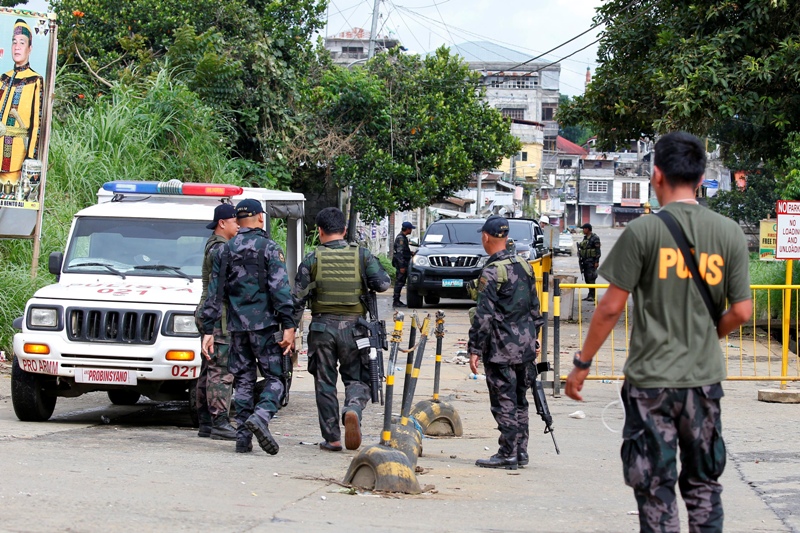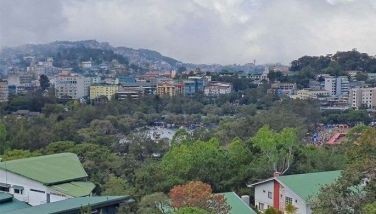Congress sees Duterte’s Martial Law request next week

Citing lingering threats from extremist groups that could derail the rehabilitation of Marawi City and endanger the security of Mindanao, the Armed Forces of the Philippines (AFP), the Philippine National Police (PNP) and some local government units recommended to the President the extension of martial law after it expires on Dec. 31. AP/Bullit Marquez, File
MANILA, Philippines — With only three days left before Congress goes on a month-long Christmas recess, President Duterte is expected to formally ask lawmakers on Monday to allow him to extend martial law in Mindanao for one more year.
“I feel that the formal request would be sent to the Senate on Monday. Then I take it up immediately with fellow senators,” Senate President Aquilino Pimentel III said.
Speaker Pantaleon Alvarez voiced the same expectation but stressed it would be difficult to convene a special session once Congress adjourns on Wednesday.
“This break is unlike any other adjournment, when we can gather lawmakers, because it is a Christmas recess. It would be difficult,” Alvarez said.
When asked about the time constraint and the expected opposition from minority senators, Pimentel said, “We have no choice. That’s our constitutional duty.”
He said he would ask his colleagues whether it would be feasible to squeeze in a joint session next week even as Congress is rushing to ratify the proposed P3.7-trillion national budget for 2018 and the Tax Reform for Acceleration and Inclusion before it adjourns.
Alvarez, who comes from Davao del Norte, said he is for extending martial law in Mindanao.
“There is continuing threat of terrorism in the island. You cannot say that just because the war in Marawi is finished, our problem has been resolved. In fact, I am for having martial law in Mindanao until the end of the President’s term in 2022,” he said.
Citing lingering threats from extremist groups that could derail the rehabilitation of Marawi City and endanger the security of Mindanao, the Armed Forces of the Philippines (AFP), the Philippine National Police (PNP) and some local government units recommended to the President the extension of martial law after it expires on Dec. 31.
Sen. Gregorio Honasan, chairman of the Senate committee on national defense and security, said he would give much weight to the AFP and PNP recommendation as they are “involved on the ground” on security matters.
“If and when the President asks for it from Congress, everything is procedural by law. Better for us to have it (martial law) when we need it than to need it and not have it, expeditiously,” Honasan said.
Sen. Joseph Victor Ejercito said he visited Mindanao four times recently and local government officials, residents and businessmen were “all satisfied” with the imposition of martial law.
“Warlords, private armies cannot move around and their movements are now restricted. Likewise problem of thousands of loose firearms in Mindanao can now be addressed with martial law in effect,” Ejercito said.
“Ordinary folks feel that they are safer and there is now a level playing field as a result of restriction of movements of private armies,” he said.
When asked about criticisms that the extension was too long, considering that Islamic militants had already been driven out of Marawi City, he said: “We cannot take chances with terrorism. It is a worldwide concern.”
“It’s (terrorism) a clear and present danger that is already here as evidenced by the Marawi rebellion,” Ejercito said.
Other senators, like Sen. Juan Miguel Zubiri, are receptive to the likelihood of Duterte’s making a formal request but said he and some of his colleagues would like to be briefed first on the prevailing situation before making a decision.
Sens. Joel Villanueva, Francis Escudero and Grace Poe voiced the same position.
“I will ask that Malacañang and security officials brief the Senate, even in executive session, as to the reason(s) for such extension before I decide,” Escudero said.
Poe said the Senate should also be allowed to listen to feedback from Mindanao officials on the effects of martial law.
President Duterte first declared a 60-day martial law in Mindanao on May 23 when militants began their siege of Marawi City. He issued the declaration from Russia while he was on an official visit.
On July 22, Congress in joint session granted his request for extension of martial law until Dec. 31.
AFP confirms request
In a regular briefing for Bangon Marawi in Malacañang, Armed Forces spokesman Brig. Gen. Restituto Padilla Jr. confirmed the AFP’s recommending martial law extension, citing lingering terror threats as well as “significant increase” in attacks by New People’s Army rebels.
He did not mention a timeframe for the proposed extension, citing lack of authority to do so.
According to Padilla, the AFP’s recommendation has been submitted to Defense Secretary Deflin Lorenzana, who in turn has forwarded it to Malacañang.
“There is a recommendation to similarly support the recommendation of the Philippine National Police,” he said.
In Mindanao, Padilla said the most significant threat comes from the Daulah Islamiyah, supposedly an umbrella group comprising the Maute group and the Abu Sayyaf, among others.
“Now, they still remain to be a threat, although they have significantly been degraded in terms of capability and manpower,” he said.
Padilla added that militants who survived the Marawi siege were recruiting new members, mostly the “vulnerable.”
“They are students, children, women and the like, as well as relatives of those who lost their lives in the fight,” he said.
“So, they are attempting to do that and the primary means for which they are doing that is through enticements of cash rewards and the like.
“This is something that we don’t want to happen, for this group to come back again with a vengeance, that is,” he pointed out.
He also cited “significant violent activities” that might be carried out by other hostile groups like the Bangsamoro Islamic Freedom Fighters (BIFF) in Maguindanao, Lanao and Cotabato.
Following Duterte’s declaration of the formal end of peace talks with the leftists, Padilla said they foresee a resurgence of violence in the countryside.
“Also, increasing violence initiated by the Left is something to watch out for and something that we have to prepare for and confront,” he said.
“That’s part of the reason why martial law may be needed to cover other areas where potential terrorists are in hiding,” he maintained.
Padilla said the Chief Executive is being briefed regularly on security issues.
From Jan. 30 to Nov. 30 this year, Padilla said there has been a 65 percent increase in violence perpetrated by hostile groups in Eastern Mindanao and Western Mindanao.
“There was a 2,000 percent increase in the amount on the effect of the violent incidents on business alone – P2.4 billion per our estimate was the amount of establishments, assets of government, construction companies and other businesses that have gone up in flames. It’s arson alone,” he said.
‘No basis’
But opposition lawmakers like Senate Minority Leader Franklin Drilon said they are strongly opposed to the second extension of martial law in the entire Mindanao, arguing that the recommendation of the AFP and the PNP “has no factual and legal basis and is patently unconstitutional.”
“We cannot continuously place Mindanao under martial law and suspend the privilege of the writ without an actual rebellion in the region,” Drilon said.
“The Constitution requires the existence of actual rebellion or actual invasion,” he added.
Citing Article VII, Section 18 of the Constitution, he said the provision on the revocation or extension of the proclamation of martial law is clear and specific, which is “if the invasion or rebellion shall persist and public safety requires it.”
“As we see it today, however, the grounds for a continued martial law in Mindanao, as cited by the AFP and PNP in the media, do not meet the requirements of the Constitution,” he said.
Determining if a rebellion exists, he said, “requires an examination of facts not just to show the persistence of rebellion but also that there is danger to public safety.”
Other members of the minority bloc, Sens. Francis Pangilinan, Risa Hontiveros, Paolo Benigno Aquino IV and Antonio Trillanes IV, also opposed any extension of martial law.
“We, members of the minority, support the position of Mindanaoans for no martial law extension in their home island. Lifting military rule, specifically in Marawi, will hasten the return of affected residents to their homes, according to its citizens,” they said in a joint statement.
“Martial law, together with the air strikes, was the reason why they fled Marawi in the early days of the Maute siege. And martial law is also the reason why they are afraid to return, even in cleared areas,” they said.
“What guarantees do they have that they can return to their old location and start life anew? As security forces reign supreme during martial law, would not military rule actually get in the way of a people-centered rebuilding and rehabilitating of the once vibrant city? What is the need for martial law? Would martial law suspend bidding for the reconstruction of the city?” – Christina Mendez
- Latest
- Trending






























